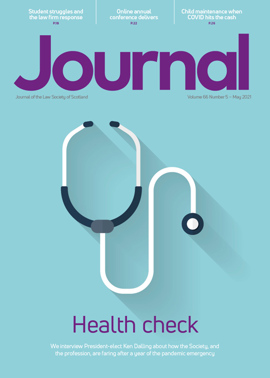Family: Contingent liabilities in company valuations

The issue of contingent liabilities and how those reflect on the valuation of company shares was again considered in LWT v GPT [2021] CSOH 6. The husband (H) and wife (W) met in 2003. W had acquired franchise interest in P companies with investment from a third party (J). Pre-marriage, two P companies owned two franchise outlets, with shares owned between W and J. H became involved in the management of P prior to the parties’ marriage in 2005. By their separation in April 2019 there were 14 separate P companies, all held between W and J.
W became increasingly less involved when the parties had children, and by the separation H was managing and operating P autonomously. All the businesses were successful and grew during H’s stewardship. Two further companies were incorporated, a property company (S), whose shares were owned between H and J, and a new franchise company (C). S and C received intercompany loans from P. Bank borrowing and a rent due by C had been guaranteed and secured against P. As at the relevant date, shares in C had no value. H did not seek transfer of W’s shares in, or sale of, C. W wanted P to be released from securities and C’s operating losses.
Experts for each gave evidence on how to account for bank liabilities and the intercompany loans. W argued that they would all impact the valuation of P as the court could only assume that they would trigger full liability to the bank, given C had no value and could not repay the loans. At the relevant date no willing seller or willing buyer would ignore them or discount the extent of the exposure.
H’s expert gave evidence that neither the purchaser nor seller of P would concede or succeed outright on the issue of these contingent liabilities when assessing the price. Money would likely be placed in an escrow account to ascertain if the debts crystallised. Neither expert was willing to offer a view on what the sum so placed might have been at the relevant date, or to calculate how the matter might otherwise be compromised.
Sale after proof
Lady Wise concluded that as at the relevant date the value, and so that of S and C, would not be reduced by any portion of the contingent liabilities or indeed the intercompany loans. Most, if not all, sums due in terms of those potential liabilities (and the intercompany loans) would be placed in an escrow account to deal with the risk that some or all might not crystallise. Lady Wise commented that her approach accorded with the general rule that contingent liabilities do not normally reduce the net value of a company either in general commercial valuation or in proceedings of this type (Liquidator of the Ben Line Steamers, Noter 2011 SLT 535; Sweeney v Sweeney 2004 SC 372). Had the companies been sold as at the relevant date, the total value of the relevant interests held by the parties, all of which were matrimonial property, would have been at a fixed sum with a proportion separated out and held in an escrow account.
While the case was at avizandum, C was sold to the franchisor with the consequent full release of P from the bank contingent liabilities, but no funds were available to repay the intercompany loans.







